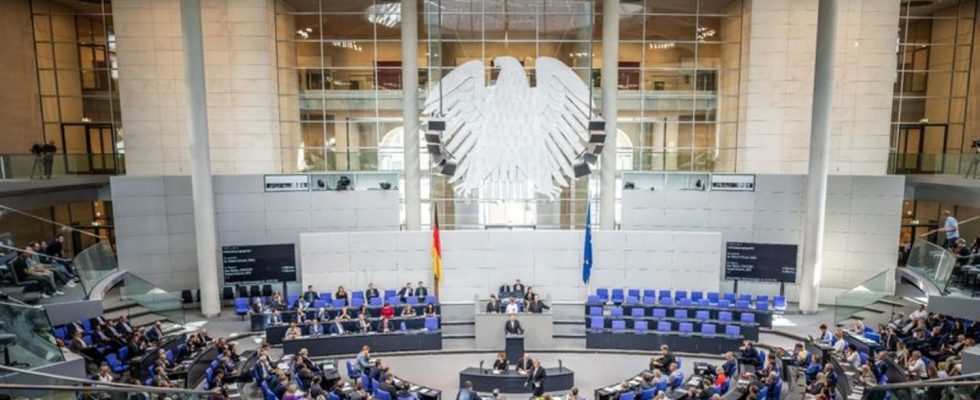Household
Traffic light coalition struggles for solutions to budget crisis
Bundestag debate on the 2024 budget. Photo
© Michael Kappeler/dpa
The coalition is heading for crucial negotiations in the budget crisis. The finance minister is hammering in pegs where savings should be made. The SPD opposes this.
Why savings need to be made
The Federal Constitutional Court had declared the reallocation of 60 billion euros in the 2021 budget to the climate and transformation fund to be null and void. The money was approved as a Corona loan, but was subsequently intended to be used for climate protection and the modernization of the economy. At the same time, the judges decided that the state was not allowed to set aside emergency loans for later years. But the federal government did this in special funds – which is now tearing additional holes in the budget. Lindner sees a “need for action” of 17 billion euros for 2024.
Negotiations at top level
SPD leader Lars Klingbeil promised difficult talks. Currently these are mainly taking place in a three-way round with Chancellor Olaf Scholz (SPD), Vice Chancellor Robert Habeck (Greens) and Lindner. There could be talks this weekend. The pressure is great: the coalition must reach an agreement within the next few days if it wants to decide on the budget for 2024 this year. The SPD party conference will take place in Berlin from December 8th to 10th.
“We will have to deal with three large cost blocks,” Lindner told the newspapers of the Funke media group. He mentioned the areas of social affairs, including citizens’ money, international financial aid and unspecified funding programs. But the coalition partner SPD doesn’t just want to talk about savings, but is also questioning the agreed waiver of tax increases, as Klingbeil made clear.
Social budget in focus
The federal government currently spends 45 percent of its spending on social issues, said Lindner. “We’ll see how we can become more accurate.” For example, it’s about getting people into work more quickly. This benefits people and also the federal budget.
With regard to citizens’ money, the Finance Minister pointed out that the inflation rate is developing significantly better than predicted when the standard rate was set for 2024. Inflation fell to 3.2 percent in November – the planned increase in citizens’ benefits from January is still based on inflation of 9.9 percent, as the social policy FDP parliamentary group spokesman Pascal Kober made clear. Lindner said: “When examining the gap between wages and social benefits, we will therefore have to look at the adjustment process. Because it always has to make a noticeable difference whether someone works or doesn’t work.”
The SPD wants to oppose cuts in the social sector. “We will not go along with social cuts at the expense of those who have sacrificed themselves for society,” said General Secretary Kevin Kühnert on Saturday at a party conference of the Thuringian Social Democrats in Meiningen. “The SPD is fighting to ensure that there is no austerity budget, that the poorest people are not the ones who suffer,” said Kühnert. The goal remains to get a federal budget for next year in place before Christmas.
Where Lindner still wants to save money
Germany is at the forefront when it comes to development cooperation and international climate protection financing, said Lindner. “We can happily stay in first place. But perhaps the gap to second place can be reduced.” Lindner also mentioned funding programs. “There are numerous subsidies for which the question must be asked whether they actually meet their objectives or whether they are out of date.” But it is still too early to name individual programs. “Otherwise this will lead to a run on funding programs at the last few meters.” The Greens have spoken out in favor of reducing climate-damaging subsidies. There should be no cuts in the Bundeswehr in view of the changed threat situation since the Russian attack on Ukraine, said Lindner.
Emergency again?
An emergency should be declared again for 2023 and the debt brake should be suspended; the Union does not want to stand in the way. Reason: the ongoing energy crisis after the Russian attack on Ukraine. Klingbeil also wants this for 2024: “There has to be savings from the federal government. But in the end I am of the firm political conviction: We have to declare an emergency for 2024 because I don’t want to get into a situation where we play off aid to Ukraine against climate investments “, he said. But Lindner is very skeptical about this. “I am not yet convinced that a new suspension can be justified in a constitutionally viable manner,” he said.
Warning of rising electricity prices
The energy industry is warning of rising electricity prices. Without a federal subsidy for transmission network fees, end customer prices would rise significantly, Kerstin Andreae, chairwoman of the executive board of the Federal Association of the Energy and Water Industry, told the dpa on Saturday. “An affordable power supply is of great importance – also from a socio-political point of view – especially in times of uncertainty.”
Specifically, it is about a federal subsidy planned for next year to partially finance the transmission network costs of up to 5.5 billion euros. The money was supposed to come from the economic stabilization fund – but as a result of the budget ruling, the federal government will have to dissolve this special fund at the end of the year. The money for the subsidy would now have to come from the core budget.

